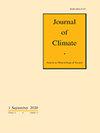厄尔尼诺/南方涛动多样性对未来大西洋热带气旋活动的影响
IF 4
2区 地球科学
Q1 METEOROLOGY & ATMOSPHERIC SCIENCES
引用次数: 0
摘要
摘要 厄尔尼诺-南方涛动(ENSO)通过影响对热带气旋生成非常重要的环境条件来影响季节性大西洋热带气旋(TC)活动。然而,未来气候变化对厄尔尼诺/南方涛动和大西洋热带气旋之间的远程联系的影响尚不确定,因为气候变化预计将同时影响厄尔尼诺/南方涛动和平均气候状态。我们利用热带通道域上的天气研究和预报模式,模拟了在不同厄尔尼诺/南方涛动条件下,历史和未来气候条件下大西洋热带气旋季节的 5 个成员集合。实验采用了基于共同体地球系统模式(CESM)大型集合的理想化海面温度配置,代表了月度变化气候、东太平洋厄尔尼诺现象、中太平洋厄尔尼诺现象和拉尼娜现象。与中太平洋厄尔尼诺现象相比,历史模拟在东太平洋厄尔尼诺现象期间产生的大西洋热带气旋较少,这与观测数据和其他建模研究结果一致。对于每种厄尔尼诺/南方涛动状态,未来模拟产生的大西洋热带气旋与历史模拟相似。具体来说,拉尼娜继续加强大西洋热带气旋活动,而厄尔尼诺继续抑制大西洋热带气旋,与中太平洋厄尔尼诺相比,东太平洋厄尔尼诺对大西洋热带气旋的抑制更大。此外,我们还发现,无论厄尔尼诺/南方涛动状态如何,未来大西洋热带气旋频率都将比历史上有所下降,这与未来热带大西洋北部垂直风切变的增加和热带太平洋海温带梯度的减小有关,这与更类似厄尔尼诺的平均气候状态相对应。我们的研究结果表明,厄尔尼诺/南方涛动在未来对季节性大西洋热带气旋预测仍然有用。本文章由计算机程序翻译,如有差异,请以英文原文为准。
The Influence of ENSO Diversity on Future Atlantic Tropical Cyclone Activity
Abstract The El Niño–Southern Oscillation (ENSO) influences seasonal Atlantic tropical cyclone (TC) activity by impacting environmental conditions important for TC genesis. However, the influence of future climate change on the teleconnection between ENSO and Atlantic TCs is uncertain, as climate change is expected to impact both ENSO and the mean climate state. We used the Weather Research and Forecasting model on a tropical channel domain to simulate 5-member ensembles of Atlantic TC seasons in historical and future climates under different ENSO conditions. Experiments were forced with idealized sea-surface temperature configurations based on the Community Earth System Model (CESM) Large Ensemble representing: a monthly-varying climatology, Eastern Pacific El Niño, Central Pacific El Niño, and La Niña. The historical simulations produced fewer Atlantic TCs during Eastern Pacific El Niño compared to Central Pacific El Niño, consistent with observations and other modeling studies. For each ENSO state, the future simulations produced a similar teleconnection with Atlantic TCs as in the historical simulations. Specifically, La Niña continues to enhance Atlantic TC activity, and El Niño continues to suppress Atlantic TCs, with greater suppression during Eastern Pacific El Niño compared to Central Pacific El Niño. In addition, we found a decrease in Atlantic TC frequency in the future relative to historical regardless of ENSO state, which was associated with a future increase in northern tropical Atlantic vertical wind shear and a future decrease in the zonal tropical Pacific SST gradient, corresponding to a more El Niño-like mean climate state. Our results indicate that ENSO will remain useful for seasonal Atlantic TC prediction in the future.
求助全文
通过发布文献求助,成功后即可免费获取论文全文。
去求助
来源期刊

Journal of Climate
地学-气象与大气科学
CiteScore
9.30
自引率
14.30%
发文量
490
审稿时长
7.5 months
期刊介绍:
The Journal of Climate (JCLI) (ISSN: 0894-8755; eISSN: 1520-0442) publishes research that advances basic understanding of the dynamics and physics of the climate system on large spatial scales, including variability of the atmosphere, oceans, land surface, and cryosphere; past, present, and projected future changes in the climate system; and climate simulation and prediction.
 求助内容:
求助内容: 应助结果提醒方式:
应助结果提醒方式:


